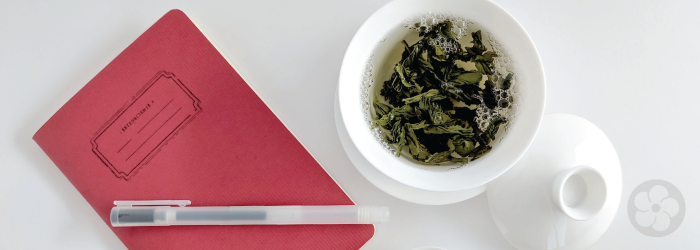4 Reasons to Keep a Tea Journal

We readily admit that we are pretty nerdy about our teas. With our focus on single origin tea, the variations in natural flavor are endless, and we are constantly tasting new harvests. A tea journal is hugely helpful in keeping track of it all. But for the casual drinker, it may seem like overkill. Here are four reasons we think a tea journal might be helpful for you too, no matter how many teas there are in your collection.
1. It will train your palate.
Learning to distinguish and recognize flavors takes focused tasting, and the easiest way to clarify and remember flavors is to write them down. Taking even very brief notes about a tea helps us remember the experience later and compare it to others.
>
2. It will help you track changing tastes.
Not only do teas change from year to year, but our taste buds also change over time. Sometimes, when we drink the same tea every day, we find ourselves using more tea as we inoculate ourselves to the flavor. Keeping track of brewing techniques can reveal when it’s time to try something new to refresh our palate.
3. It will improve your brewing techniques.
On the topic of brewing, we all know how much the method can influence the final result. Particularly when trying new teas, it is helpful to keep a record of what works, and what doesn’t. Recording any mistakes makes them easy to correct in the next pot.
4. It will help you assess quality and value.
In our search for the best traditional teas, we encounter many which are good but not great. They might be difficult to brew, lose flavor after only one or two infusions, or require more than the usual amount of leaf. While these teas might be forgiven on a brew-by-brew basis, taking notes allows us a broader view of their overall value.
For those of us who make tea a habit, keeping a record of brewing techniques or tea seasons might feel mundane. But taking a closer look at the teas we drink and how we brew them can push us to pay more attention to the process, and ultimately take more enjoyment in our teas.
Do you keep a tea journal? Let us know how it works for you in the comments below!
Sign up for our newsletter to get blog updates in your inbox!




Comments on this post (0)